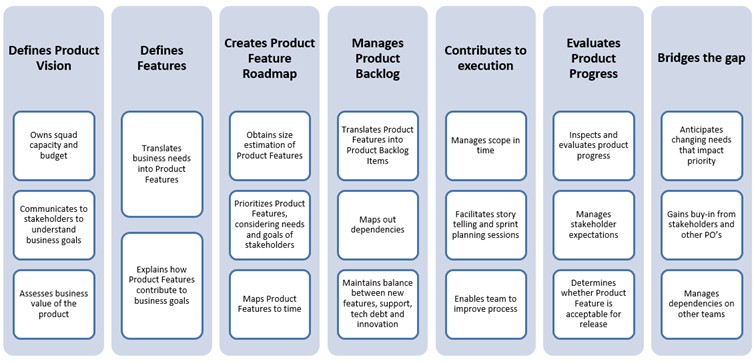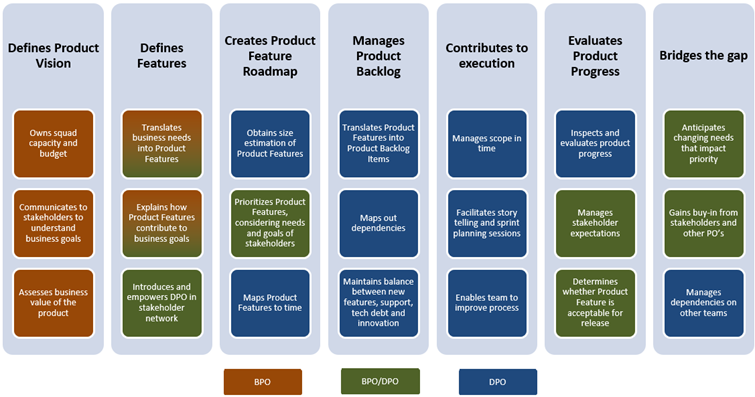One of the most important innovations the Agile methodology has brought to product (and project) management is the role of the Product Owner. Despite the large-scale adoption of Agile practices, we still see companies and Product Owners struggling to get the most out of this role. That inspired us to come up with our Delegated Product Owner solution.
With the arrival of the Agile methodology, the introduction of the Product Owner role marked a shift away from the rigid planning and milestone mindset of traditional project managers towards a more entrepreneurial and value-based approach. In other words: responding to changes over the course of a project.
In the Data & Analytics space the Product Owner role has proven to be just as important and as just as difficult to fill. A combination of a technically skilled, mature development team and a business-focused Product Owner (BPO) has proved a magic formula for many companies pushing the envelope of data and analytics solutions.
And yet despite the promise and success stories, for many companies, the magic remains elusive. Why?
A general answer to this question is that the innovative combination of skills and insights that make the PO role so special is very rare. And even with the right person the wrong work environment can trip things up. We see three types of challenges arising around the PO role:
- Perhaps the most common challenge we see is what we call “one-sided Agile transformations”: Companies where the IT department has adopted Agile, but the business departments have not. The resulting culture clash can leave BPOs feeling like a fish out of water and unsure of what their role and responsibilities are. This in turn can lead to frustration and misdirected anger towards Agile .
- When business managers are assigned a PO role on top of their existing assignments. This often means that the BPO cannot give enough time to the development team resulting in a low value potential and direction of the product, not to mention frustration on both sides.
- In companies that have executed Agile Transformations across the entire organization we often see another type of challenge arising that is quite specific to the Data & Analytics domain: BPOs that lack experience in software development and/or data and analytics knowledge. This can negatively impact their ability to communicate effectively with the development team resulting in low quality and reusability of D&A software.
None of these challenges are insurmountable. However, few companies operating in rapidly changing markets have the luxury of time (or resources) to sort these problems out before embarking on high-value transformation projects. Instead, faced with the pressure to “innovate or die” they push projects through without having all the critical success factors in place. The results can range from expensive “lessons learned” to large-scale project failures.
At Just-BI, we work with a lot of companies facing these challenges. This inspired us to come up with a solution that would help companies and BPOs to flourish without slowing their pace of innovation or short-circuiting their learning curve.
Our solution is called Delegated Product Owner.
A Delegated Product Owner (DPO) is a certified Agile Product Owner with a strong Data & Analytics technical background and expertise. S/he supports the PO by providing short-term relief in the form of filling gaps in terms of experience, skillset and/or focus while developing a long-term transition plan that will lead to one of the following outcomes:
- The BPO is guided, coached and assisted in his/her development towards becoming a strong and knowledgeable, technical and functional Product Owner – this scenario is a good outcome for customers intent on creating the conditions that will allow business managers to grow into a dedicated PO role.
- The DPO is coached and introduced to the business by the BPO, ultimately taking on the role of Product Owner role themselves – this approach is appealing to customers looking for new resources to build their Agile practice, and where the current cannot be expected to dedicate 100% of their time to the role.
- The BPO and DPO continue to work in unison for the duration of the ‘project’ – this scenario can be appealing to customers with short-term project needs that do not justify a long-term investment in the development of an in-house PO role.
So how does the division of labor work in practice? We started by analyzing the main responsibilities of a traditional Product Owner:

Then we defined which responsibilities could be delegated to the DPO, which ones needed to remain with the BPO, and where responsibilities could be shared:

The division of responsibilities is dynamic; with time the shift in responsibilities can either be kept as-is or shift towards one or the other dependent to which scenario is chosen.
Our Delegated Product Owner solution creates symbiotic partnerships between highly skilled business managers and our experienced Agile Product Owners. It can provide welcome short-term relief to an overwhelmed BPO while laying the foundations and making the transition to a suitable long-term arrangement.
If you want to know more about the Delegated Product Owner and how this concept can help your organization, please contact us.
Just-Authors: Diana Coelho & Patrick Pronk.
Thanks to Katja Vos, Maarten Kalk and others for their contribution.
